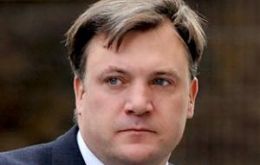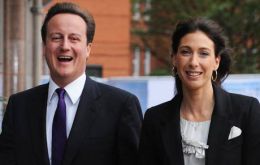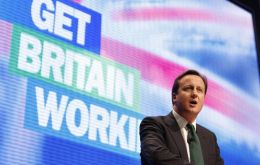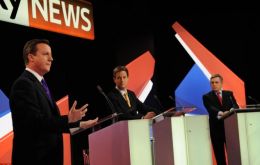MercoPress. South Atlantic News Agency
Tag: Labour Party (UK)
-
Tuesday, May 11th 2010 - 03:40 UTC
PM Brown Steps Down to Open Way for Labour Government with Lib Dems

British Prime Minister Gordon Brown has announced he will step down as Labour leader by September, as his party opens formal talks with the Lib Dems about forming a government.
-
Monday, May 10th 2010 - 05:38 UTC
Cameron Inching Closer to 10 Downing, but Minority Government an Option

Negotiators for Conservative David Cameron and Liberal Democrat Nick Clegg completed their third session in search of a deal to form a new British government as they faced pressure to reassure investors over political stability.
-
Saturday, May 8th 2010 - 06:36 UTC
Tories and Lib Dems Hold Coalition Talks; Agree PM Brown Should Walk Down

Conservative leader David Cameron has reached out to the Liberal Democrats in an effort to form a government after the UK general election resulted in a hung parliament. The Tory leader, whose party won most seats but was short of a majority, said he wanted to make a “big open and comprehensive offer” to the Lib Dems.
-
Friday, May 7th 2010 - 05:42 UTC
Hung Parliament in UK: Labour Looses but Cameron Short of a Majority

British Conservative Leader David Cameron said the Labour government has lost its mandate to govern, as exit polls suggested the Tories have won the largest number of seats in Britain's national election, but will not gain a majority.
-
Wednesday, May 5th 2010 - 23:53 UTC
UK Hung Parliament, 43% or Tories, 36% Anticipates The Guardian/ICM Poll

All three British main parties will have reason to be disappointed if the Guardian/ICM eve-of-poll survey is reflected in election results Thursday night. The Conservatives are set to fall well short of the convincing majority that, not long ago, seemed within their grasp. Labour faces one of its lowest votes of modern times and the Liberal Democrats may fail to make their hoped-for breakthrough to second place.
-
Friday, April 30th 2010 - 05:23 UTC
“Momentum” for Tory Leader Cameron After Final Debate, According to BBC

British Prime Minister Gordon Brown made on Thursday a plea to voters not to risk change as he sought to salvage Labour's election campaign in the final TV debate before polling day.
-
Tuesday, April 27th 2010 - 18:50 UTC
Electoral Reform Shapes as Key Issue for Next UK Government

Electoral reform is shaping up as the key issue in determining what sort of government would emerge in the UK if the May 6 General Election results in a hung Parliament. Liberal Democrat leader Nick Clegg indicated that a deal on proportional representation would be essential to any pact if his party holds the balance of power, describing it as an “absolute pre-condition” for renewal of Britain.
-
Tuesday, April 27th 2010 - 18:13 UTC
UK Think Tank Warns About Drastic Spending Cuts After Election Day

All three British major political parties are failing to come clean on spending cuts that will need to be at least as deep as the 1970s, a leading think tank warned Tuesday. Repairing the public finances will be the 'defining domestic policy task of the next government', the Institute for Fiscal Studies said at a special election briefing.
-
Monday, April 26th 2010 - 06:04 UTC
Lib-Democrats Discard Support for PM Brown if Labour is Third in Popular Vote

Britain’s Liberal Democrats said they would not back Primer Minister Gordon Brown if his party came third in the popular vote on May 6, even if the nation's electoral system gave Labour the most parliamentary seats.
-
Saturday, April 24th 2010 - 01:03 UTC
Tory Leader Cameron Gains Ground in Latest Debate according to Polls

British Conservative leader David Cameron gained ground on the Liberal Democrats' Nick Clegg in the leaders’ debate, as polls gave conflicting verdicts on which of the two won.
